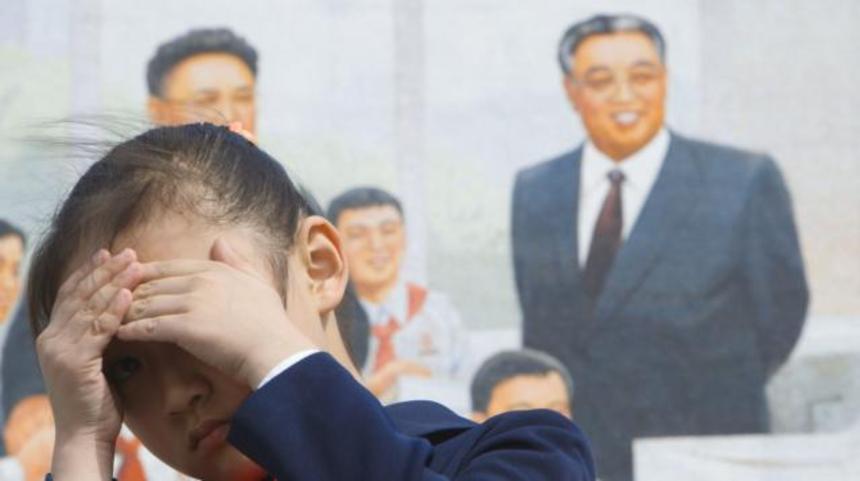Black Nights 2015 Review: UNDER THE SUN, A Peek At North Korean Propaganda

What little we know of it comes either from those who have escaped (who do not tend to paint a pretty picture) or what little information comes from the country itself. The latter gives an image of North Korea as the ideal country, with a happy population dedicated to their leader, both past and present.
Under the Sun, the latest documentary by veteran Russian filmmaker Vitaly Mansky, was overseen almost completely by officials of the Democratic People's Republic of Korea (DPRK, as it is officially known). As such, you might expect to walk away with whatever image you think those officials want you to have, and likely that was their intention. Instead, what Mansky gives, even under these restraints, is an odd and fascinating portrait of this nation.
The film focuses on the Lee family, husband, wife, and especially their young daughter, Zin-mi. Zin-mi is welcomed into the Children's Union, a 1.5 million-strong organization in which children participate in official cultural activities. We also see her father and mother at their places of work - a fabric factory and a soy milk factory, respectively - and the family's participation in two official holidays celebrating Kim Il-Sung (the long-time leader of North Korea until 1994) and current leader, Kim Jong-un.
Where does propaganda end, and genuine national pride begin? Who is to say what are lies and what is the truth? What is the information we have outside of North Korea is false? Probably there are both truth and lies in what we know. Certainly, the description of the film given on the Black Nights Film Festival website talks of the country as being 'ideal', with 'ideal people' living the 'ideal' life; but this is perhaps what the people behind the film are trying to convey rather than the truth (no country is ideal).
What is shown is vignettes of this life. A scene at Zin-mi's school, where the teacher tells the children how their 'generalissimo' Kim Il-Sung saved them from the Japanese and landlords (hence the benefit of communism), and how their current leader will save them from the evil Americans and other cowardly enemies. We see Zin-mi and her parents having dinner, with enough food to feed twice their number, but the staging of this dinner is made clear, as a few takes are shown, with the DPRK director instructing them on how to say their lines. This happens in several scenes, including one with an old general telling some schoolchildren about his time in the Korean War. So this is not only propaganda itself, but also a look at the manufacture of propaganda, or the manufacture of documentary film.
So how much is manufactured, and how much isn't? It's impossible to say with certainty, since so much of the film is build around ceremony: the ceremony of school, of work, of praise to the leaders. Indeed, the film gives the very strong idea that all of North Korean life is set around its leaders as mythic figures, as dead and living gods. This is in line with what we outside are told. But one thing the people in the film can't seem to do, even with the cameras rolling, is show great enthusiasm or geniune affection for this way of life. Most faces display resignation and fatigue, as though this display for the camera is just another ritual in which they no longer have faith.
I assume the DPRK officials thought that by focusing the story on a child, it would show how children grow up in this 'ideal' place to become 'ideal' and thereby happy citizens. But the film has the opposite effect: as Zin-mi joins the Children's Union and has duties placed on her, she becomes serious and sad. When asked to recite a poem or song that makes her happy, she takes a long time before talking about the great leaders and how she must live up to their expectations. She does so while crying, and not with happiness.
Under the Sun is a somewhat surreal and yet very telling look into a world few of us know anything about, and I think will have the opposite intention of what those in North Korea intended. While Mansky and his team's hands were metaphorically tied in terms of content, I think their desired effect will reach its audience, one that might have several suspicions as to what life in this country, confirmed.

Do you feel this content is inappropriate or infringes upon your rights? Click here to report it, or see our DMCA policy.






